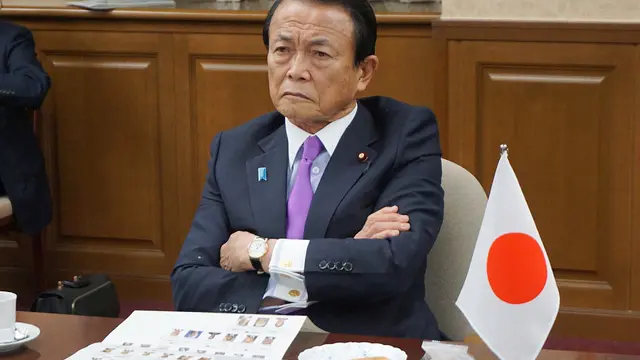Despite stern warnings from China, former Japanese Prime Minister and Vice President of the ruling Liberal Democratic Party (LDP) Taro Aso began his three-day visit to China's Taiwan region on August 7. Aso's trip should be seen as a blatant act of provocation from Tokyo as it looks to step-up unwarranted links with Taiwan authorities, and cater to separatist forces in the process.
As the most senior LDP member to visit the Chinese island, Aso's visit cannot be viewed in isolation. He is leading a delegation that includes members of the Japanese Congress and has backed pretexts of an "attack" on Taiwan to fuel defense spending hysteria in Japan.
By undermining calls to bridge misunderstandings in China-Japan diplomatic relations, Aso's visit symbolizes substantial disregard for the one-China principle that serves as the linchpin of dependable neighborly ties. China has consistently and resolutely opposed Japanese politicians' visits to Taiwan for political benefit, said the Chinese Foreign Ministry in a written statement before Aso's trip.
Japan shouldn't pretend there is any room for compromise on China's territorial sovereignty. During his visit, Aso is expected to meet Democratic Progressive Party (DPP) authorities as well as sanctioned secessionist Joseph Wu. All this comes at a time when LDP's leadership is tightening its embrace of Taiwan independence forces through "high-level" engagements.
Past attempts to feed into pro-independence sentiment in Taiwan have cost Japan some of its diplomatic goodwill with Beijing, and Aso's visit risks straining relations further. "[It is hoped that] Japan will establish an objective and rational understanding of China, [and] draw lessons from history through concrete actions," Chinese Foreign Minister Wang Yi told his Japanese counterpart in a meeting last month.
Within Japan, the LDP vice president is known for amplifying narratives about Taiwan's independence, claiming that "A Taiwan contingency is a contingency for Japan." For years, Aso has lobbied for Japanese "self-defense" in a bid to legitimize interference in China's Taiwan region although China's support for reunification and territorial defense remains unwavering. In 2021, Aso touted falsehoods about a Chinese "invasion" of Taiwan, and the need for Tokyo to perceive such assumptions as due cause for collective self-defense.
During his visit this week, Aso has made no secret of speaking at a regional security forum organized by the Prospect Foundation, an entity sanctioned by Beijing for notoriously supporting Taiwan's independence, which raised the prospect of hard diplomacy from China to protect its legitimate internal affairs.
Aso's Taiwan trip is expected to justify their focus on issues such as economic and technological "cooperation" with DPP authorities, while there is no legal or sovereign basis for any such cooperation. Beijing's fitting rebuke of such sensational rhetoric in the past is a wake-up call for the LDP leadership to relinquish the myth of substantive "cooperation" with the local authorities.
As a result, Aso's visit signals growing appetite in Tokyo for unchecked provocations over the Taiwan question, when the costs of flagrant interference are abundantly clear. If current provocations sustain, Japan is likely to push their ties with China towards a downward spiral.
Aso's three-day trip is likely to further the aspirations of China hawks in Tokyo, who wish to lend a lifeline to diehard Taiwan separatists at the expense of smooth Sino-Japanese relations. Tokyo cannot position itself as a proponent of cross-Straits peace, when it actively furthers unwarranted contacts with the Chinese region in violation of the 1992 consensus.
(CGTN)
 简体中文
简体中文

